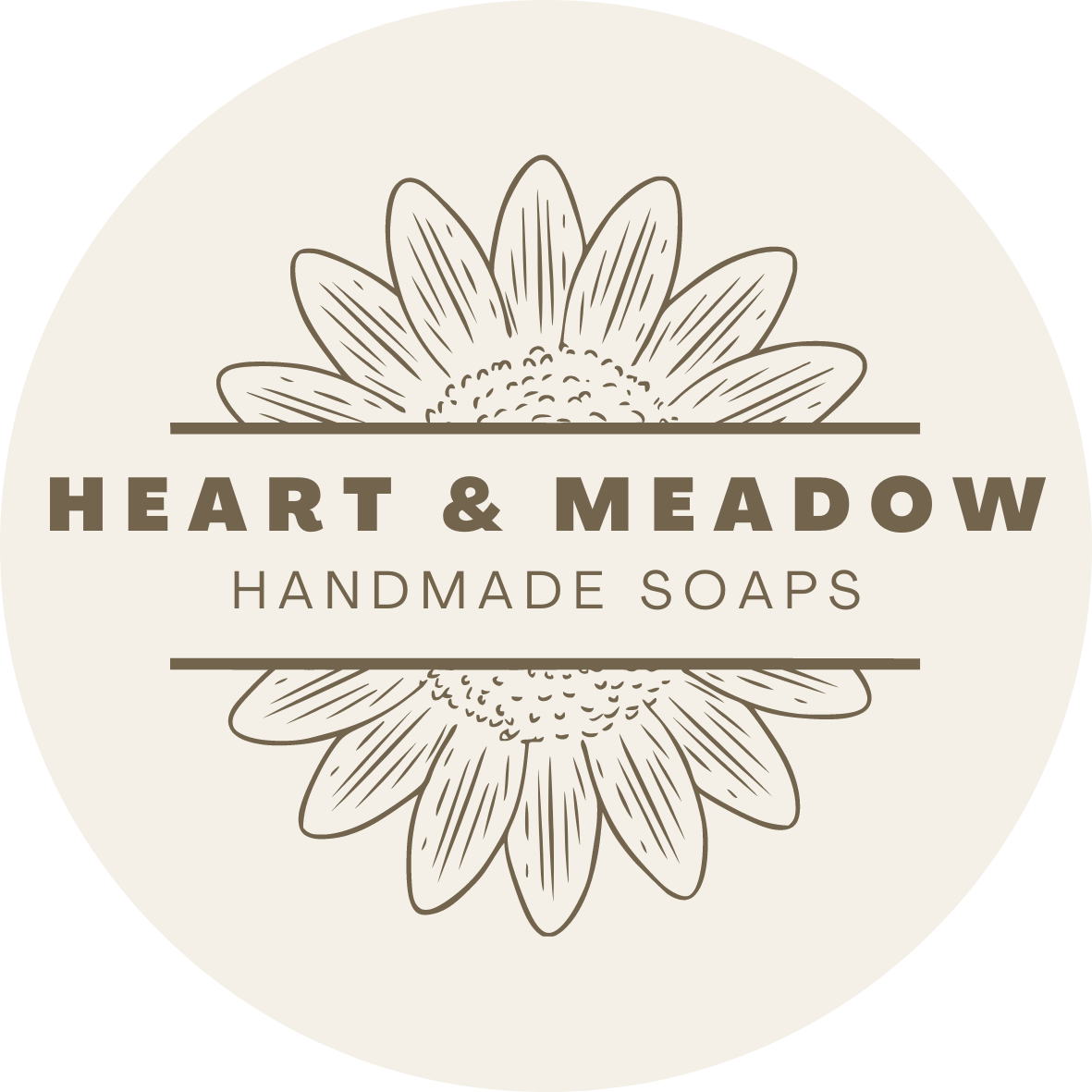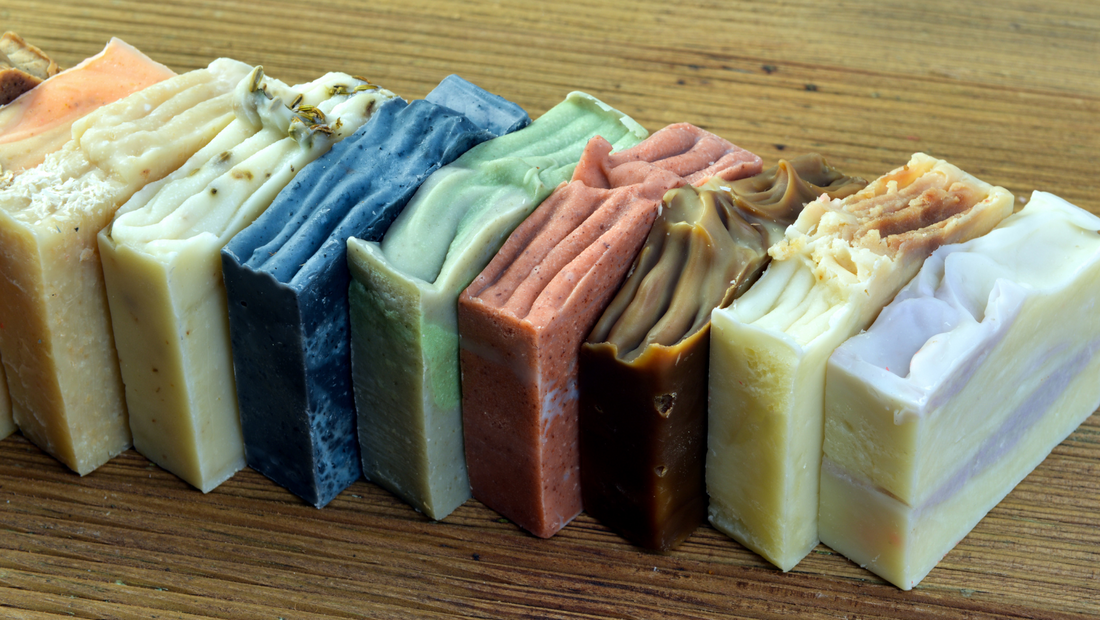In a world saturated with mass-produced products, it's refreshing to discover the simplicity and beauty of handmade soap. With its pure ingredients and gentle manufacturing process, handmade soap offers an array of benefits for your skin and the environment.
Not all Soap is Created Equal
There are 4 main types of soap - Cold Process, Hot Process, Melt & Pour, and Mass-Produced/Commercial. At Heart & Meadow, I only craft Cold & Hot Process soaps from scratch in small batches, using the highest quality, natural ingredients. I use the term "handmade soap" to refer to both Hot & Cold Process soaps. So what is it?

Cold Process Soap
- Process: In cold process soap making, oils are mixed with lye, initiating the saponification process. This method requires weeks of curing to allow the soap to harden.
- Ingredients: Natural oils like olive, coconut, and avocado oils are commonly used, providing moisturizing properties.
- Artistic Expression: Cold process soap allows for intricate designs, colors, and scents, making it a favorite for artisans.

- Process: Hot process soap involves cooking the soap mixture, usually in a slow cooker or on the stove. This accelerates saponification and reduces the curing time required for cold process soap.
- Ingredients: Similar to cold process soap, using natural oils & lye. Hot Process is great for using fragrances that may misbehave in cold process applications (like florals!).
- Texture: Hot process soap tends to have a more rustic texture (as shown above) compared to the smoother finish of cold process soap.

Melt & Pour Soap
- Process: Melt & Pour soap uses a ready-to-use, store-bought base that requires melting and then pouring into molds. It skips the saponification process altogether.
- Ingredients: Often contains pre-saponified soap base along with additional ingredients for texture, fragrance, and color.
- Ease of Use: Melt & Pour is beginner & kid-friendly, allowing for quick and easy soap crafting without dealing with lye. On the other hand, whether or not melt & pour is truly "handmade" is debatable. I personally don't have a problem with it, but if you're looking for something made from scratch, check the label or ask the maker.

Grocery Store Soap
- Ingredients: Commercial soaps found in grocery stores often contain synthetic detergents, harsh chemicals, and minimal amounts of natural oils. Although not all detergents are necessarily harmful, companies will often incorporate cheaper alternatives in order to maximize profit. Soaps like Dial, Dove, Irish Spring, etc are not actually soap - they are synthetic detergent bars, or "Syndet Bars" for short.
- Process: Manufactured through a faster and more industrialized process, with the addition of synthetic fragrances and preservatives.
- Effect on Skin: Grocery store soaps may strip the skin of natural oils, leading to dryness and irritation, especially for those with sensitive skin. Some people are also allergic to the ingredients in commercial syndet bars.
Why is Handmade Soap Better for You?
Gentle and Nourishing
One of the most significant advantages of handmade soap lies in its ability to retain the natural properties of its ingredients. This soap-making method ensures that the beneficial oils, such as olive oil, coconut oil, or shea butter, remain intact, providing your skin with vital nutrients and moisturization. These natural oils help restore the skin's balance, leaving it soft, supple, and hydrated.
Chemical-Free
Commercial soaps often contain preservatives and harsh chemicals that can strip

the skin of its natural oils, leading to dryness, irritation, and potential long-term damage. Handmade soap, on the other hand, is free from these harmful additives. It is crafted using simple, recognizable ingredients, making it an excellent choice for individuals with sensitive skin or those seeking a more natural and holistic approach to skincare.
Customizable
One of the joys of handmade soap is its versatility, both for the maker and the user. Soapmakers have the freedom to create unique and tailor-made formulas to suit various skin types and preferences. Whether you have oily, dry, or combination skin, handmade soap can be crafted with specific ingredients, such as essential oils or botanical extracts, to address your skin's individual needs. Hand crafters also have access to a vast array of scents, additives (like coffee or salt for exfoliation, activated charcoal for detoxifying, or fruit purees for vitamins & minerals!) and colors, so the opportunities for creative expression are limitless.
Eco-Friendly
By opting for handmade soap, you are making a conscious choice for the environment. The traditional method produces soap with minimal waste and energy

consumption. Additionally, many artisans who create handmade soap (myself included!) prioritize sustainability by using responsibly sourced ingredients and packaging materials that are biodegradable or recyclable. By supporting these eco-conscious producers, you contribute to the larger movement towards a greener and more sustainable future.
In summary, handmade soap offers a natural and gentle alternative to the commercially available options, providing a host of benefits that go beyond cleansing. From its nourishing properties to its eco-friendly nature, handcrafted soap represents a skincare choice that not only benefits you but also the planet.

